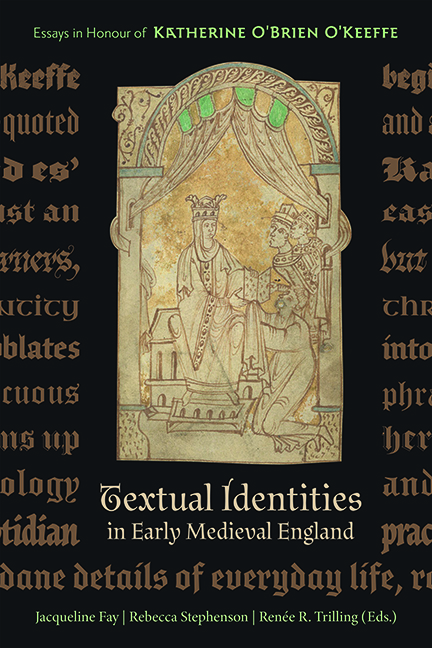Book contents
- Frontmatter
- Contents
- List of Illustrations
- List of Contributors
- Acknowledgments
- List of Abbreviations
- Introduction
- Part One Affect and Embodied Cognition in Medieval Didactic Texts
- Part Two Sovereignty, Power, and English Textual Identities
- Part Three Acts of Public Record in Making and Sustaining Communities
- Overview Of Career
- The Writings of Katherine O’Brien O’Keeffe
- Bibliography
- Index of Manuscripts
- General Index
- Tabula Gratulatoria
- Anglo-Saxon Studies
1 - Prudentius's Apotheosis and Hamartigenia in Early Medieval England
Published online by Cambridge University Press: 26 May 2022
- Frontmatter
- Contents
- List of Illustrations
- List of Contributors
- Acknowledgments
- List of Abbreviations
- Introduction
- Part One Affect and Embodied Cognition in Medieval Didactic Texts
- Part Two Sovereignty, Power, and English Textual Identities
- Part Three Acts of Public Record in Making and Sustaining Communities
- Overview Of Career
- The Writings of Katherine O’Brien O’Keeffe
- Bibliography
- Index of Manuscripts
- General Index
- Tabula Gratulatoria
- Anglo-Saxon Studies
Summary
IN THE century before the Norman Conquest, English monks imbibed the core virtues of the Benedictine identity – obedience, silence, and humility – not solely from Benedict's Rule. As Katherine O’Brien O’Keeffe deftly shows, literary works used for instruction in Latin grammar, style, and prosody also invited students to contemplate their identity as Benedictine monks, to learn about the psychology of obedience, and to understand how the individual's free will might rightly be deployed within a community that exalted the practice of obedience. O’Brien O’Keeffe devotes special attention to three works that students encountered at an elementary phase of their education: Ælfric's Colloquy, the Disticha Catonis, and Prosper's Epigrammata. Prosper, in particular, treats the causes and psychological mechanisms behind human desires, both upright and perverse; for a monastic readership, his commentary on human desires and free will in general contextualized and corroborated what Benedict's Rule taught about desire and free will within the constraints of the cenobitic life. O’Brien O’Keeffe's chapter on the moral dimension of the Latin curriculum suggests a direction for further study of what the other texts of the Latin curriculum taught early medieval students about the nature of the soul and the psychological mechanisms underlying obedience, self-control, concupiscence, and sin. For instance, where the Consiliarius of Ælfric's Colloquy admonishes young pupils, ‘Be what you are, because it is a wrong and a shame for a man to want not to be what he is’, this is but a foretaste of what Boethius's De consolatione philosophiae would impart to pupils at a more advanced level of the literary curriculum: the root of every misery and misdirected appetite is the human soul's forgetfulness of its own nature and of the divine reason that governs the cosmos.
In this essay, I extend this method of inquiry to two long Latin poems that have been largely neglected by intellectual histories of tenth- and eleventh-century England, namely Apotheosis (The Divinity of Christ) and Hamartigenia (The Origin of Sin), composed by Prudentius early in the fifth century CE. These poems take a stance on questions that Old English and Anglo-Latin authors revisited frequently, such as the nature of the soul and the condition of the individual at the Last Judgment; they also impart ideas pertinent to monastic discourses on free will, as Prudentius dwells on the involvement of body, soul, and demonic influences in the psychological mechanisms of free choice and sin.
- Type
- Chapter
- Information
- Textual Identities in Early Medieval EnglandEssays in Honour of Katherine O'Brien O'Keeffe, pp. 13 - 33Publisher: Boydell & BrewerPrint publication year: 2022



